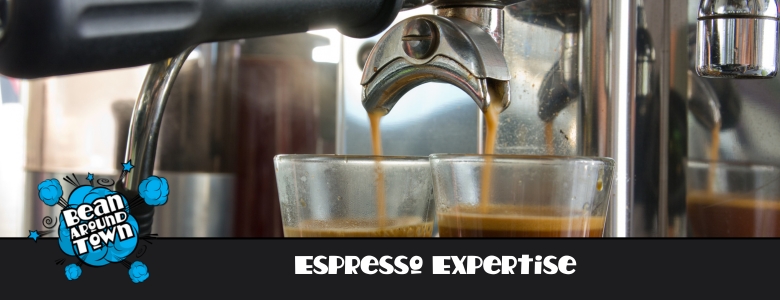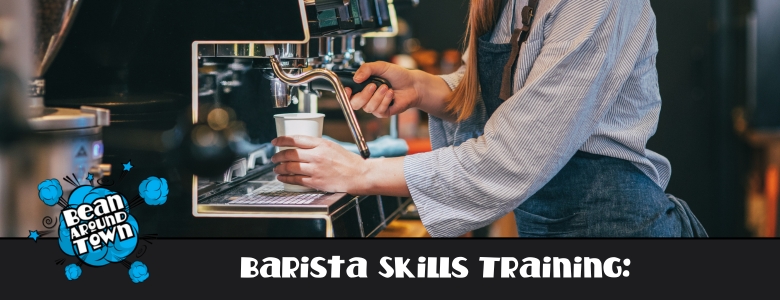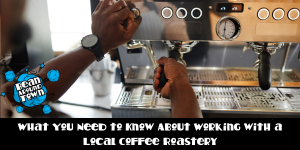Dreaming of crafting the perfect espresso or creating stunning latte art? Barista skills training opens doors to exciting careers in specialty coffee and beyond. This guide provides a practical roadmap for aspiring baristas, from understanding coffee origins to managing a workspace.
Table of Contents
Coffee Knowledge 101
Barista training goes beyond practical skills. It’s about appreciating coffee itself.
Understanding flavour profiles is essential. This knowledge helps baristas recommend the right brew for customers with unique preferences.
From Bean to Brew: Coffee Production
Learn about coffee production, processing, and roasting through a barista course designed to take your skills to the next level. Explore the distinctions between washed, natural, and honey-processed coffees.
Understand how roast profiles impact taste and brewing. Discover the difference between single-origin and blends, and the influence of growing regions.
With an advanced barista course, dive deeper into decaffeination methods, like Swiss Water, and how they alter flavour.
The Art of Extraction
Mastering extraction is crucial. Learn how variables like grind size, coffee-to-water ratio, temperature, and roast profile impact flavour.
This understanding is key to unlocking barista mastery.
Mastering the Grind
Freshly ground coffee is non-negotiable for optimal flavour.
Barista training delves into how various brewing techniques necessitate different grinding procedures.
Grind Size & Calibration
Learn how to adjust your grinder for various brewing methods and coffee beans. A fine grind intensifies flavour with slower extraction.
A coarser grind increases extraction times for smoother blends. Daily calibration accounts for factors like weather and bean age that affect your coffee profile.

Espresso Expertise
Espresso-making is a core skill in nationally recognised barista training courses.
Precise tamping ensures even water flow, optimising extraction.
Pre-infusion and pressure profiling can enhance your coffee’s depth.
Beyond Espresso: Mastering Milk & Art
Most coffee orders involve milk. Learn the art of milk steaming, considering how wand position, steaming times, and milk temperature influence the final texture. Latte art transforms a simple coffee into a visual masterpiece.
Practice with various milk pitchers to create hearts, tulips, rosettas, and even peacocks.
Remember, pour speed changes depending on the milk type.
Manual & Batch Brewing
Manual brewing techniques, such as using a Kalita Wave or Aeropress, cater to filter coffee lovers.
Experiment with different filters and recipes to refine your brewing. Engaging with customers about these methods enhances their coffee experience.
Batch Brew Brilliance
Batch brewing provides efficiency for high-volume settings. Understand the nuances of batch brewing to offer a wider range of coffee options. Refine your skills on specific equipment to consistently achieve desired profiles.
Troubleshooting & Recipe Creation
Go beyond the basics and create signature blends. Experimentation is crucial for refining recipes. Apply the principles of extraction times, grind sizes, and brewing temperatures.
Troubleshooting and Taming Brewing Tantrums
Troubleshooting is a crucial aspect of barista training. Identify and fix issues, such as oily or watery batch coffee. Learn to resolve problems with espresso shots, such as lack of body or excessive bitterness.
These challenges develop your problem-solving skills and deepen your coffee knowledge.
Creating Signature Drinks and Fine Tuning Recipes
Barista training encourages creativity. Develop signature drinks by drawing inspiration from other culinary disciplines.
Experiment with flavour combinations, aromas, and textures to create unique beverages. Craft seasonally inspired drinks that complement your cafe’s offerings and attract customers.
Hygiene & Workspace Management
Maintain a clean workspace to uphold food safety standards (SITXFSA007). Implement thorough cleaning procedures for equipment, both preparation and serving.
Adhere to workplace hygiene guidelines and regulatory requirements.

Barista Skills Training: Your Path to Coffee Mastery
Technical skills are essential, but personal traits matter too. Teamwork and exceptional customer service are vital for career progression.
Consider enrolling in a recognised barista training college that offers hospitality courses to develop your customer service abilities. A polished personal presentation also enhances customer interactions.
Those interested in leadership roles should prioritise professional development in customer service and management. Many cafes and restaurants offer nationally recognised training, providing excellent job opportunities. This offers career stability and financial security within a growing industry, which might also include learning about coffee equipment and advanced coffee training.
FAQs about barista skills training
How do I learn barista skills?
Seek reputable barista schools, coffee academies, or experienced mentors. Choose nationally recognised training programs for quality training outcomes.
Gain hands-on experience through apprenticeships or working in cafes, restaurants, and bars. Combine theoretical knowledge with practical application for complete mastery. Practice is key to refining your coffee-making techniques.
What skills do you need for a barista?
Customer service is paramount, especially in fast-paced cafe environments. Accuracy, speed, and a friendly demeanour contribute to positive customer experiences. These interactions drive repeat business. A strong focus on customer service enhances your long-term employment prospects within cafes and related businesses.
What training and knowledge is required to be a barista?
While no formal requirements always exist, specialised training and nationally accredited courses broaden career prospects. Gain expertise in diverse areas such as machine maintenance (including cleaning espresso machines) and latte art.
These skills elevate the customer experience and strengthen job applications within cafes, restaurants, and bars serving espresso coffee. Consider a Certificate III qualification, which is nationally recognised, for a strong foundation.
What does barista training include?
Barista training programs offer a range of nationally recognised courses. Look for hospitality-focused courses that emphasise customer service.
These skills are crucial for success in any coffee-serving establishment. Training often covers safe serve practices (SITXFSA007), hygienic practices, espresso preparation (including how to serve espresso coffee), and latte art. Many courses provide hands-on experience with various coffee machines, both manual and automatic.
Some registered training organisations may offer a day certificate program recognised nationally as an additional qualification to support ongoing professional barista development within restaurants, bars and other food service operations across Melbourne.
Conclusion
Barista skills training equips you with technical expertise and personal skills for a rewarding career. Explore various brewing styles, master espresso extraction, and even consider becoming a professional latte artist.
Combine your coffee passion with creativity to craft unique beverages. Begin your barista skills training journey today to discover the exciting world of specialty coffee. Whether your career goals are modest or grand, the coffee industry has room for your barista training journey. Learn everything from proper grinding skills to serving espresso coffee. It is never too late to start barista skills training.






